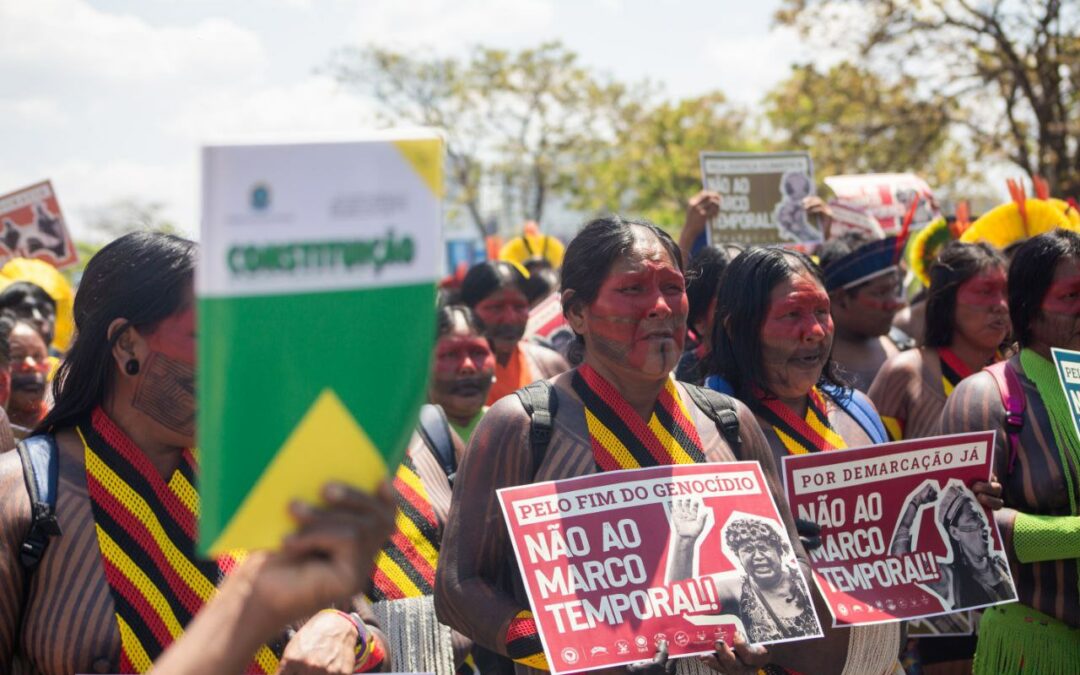Photos: Sheyden/ @1sheyden
The largest indigenous mobilization in Brazil will take place from April 22nd to 26th in Brasília (DF).
The theme “Our existence is ancestral. We’ve always been here” marks the 20th edition of the Free Land Camp (Acampamento Terra Livre – ATL), which will be held from April 22nd to 26th at the National Arts Foundation (Funarte) in Brasília (DF). ATL 2024 takes place after the overturning of the Time Frame in the Supreme Federal Court (STF) and the approval of law no. 14,701/2023, which legalized the thesis and various crimes against indigenous peoples last year.
“We continue mobilized and in the fight. ATL is the largest indigenous mobilization in Brazil and the expectation is that ATL 2024 will be the most participatory in history, both in terms of the number of people and the representation of peoples. It’s time for us to come together in assemblies and discuss the next steps,” says Kleber Karipuna, executive coordinator of Apib.
The Free Land Camp is organized by the Articulation of Indigenous Peoples of Brazil (Apib) and its seven regional grassroots organizations: Apoinme, ArpinSudeste, ArpinSul, Aty Guasu, Terena Council, Coaib, and Guarani Yvyrupa Commission.
Indigenous Emergency
The confrontation against the Time Frame thesis is one of the central themes of ATL, as violence against indigenous peoples has intensified. According to data collected by the Protect Collective, in the first month after the approval of Law No. 14,701, six indigenous leaders were assassinated in the country. This data covers the period from December 14, 2023 – the date the law came into effect – to January 21, 2024. During the same period, 13 conflicts were also mapped in territories located in seven states.
One of the assassinations was that of the pajé Nega Pataxó, from the Hã-Hã-Hãe people, during a criminal action by the Military Police of the State of Bahia with the “Zero Invasion” group. The local leader was killed during the retaking of the Caramuru-Paraguaçu territory, in the municipality of Potiraguá.
Apib asserts that Law No. 14,701 represents an action of genocide of indigenous peoples, as the constant violence in the territories is a result of the legalization of the time frame, approved in 2023 by the ruralist caucus of the National Congress, which has promoted various attacks against the rights of indigenous peoples. According to the Articulation, the halt in the demarcation of indigenous lands also exacerbates this scenario of violence.
In 2022, the final report of the Indigenous Peoples Working Group of the Transition Office, of which Apib was a part and coordinated, presented to the Lula Government 14 indigenous lands that were ready to have their demarcations ratified in the first 100 days of the government. However, throughout 2023, only 8 ancestral territories were demarcated by President Lula.
“In terms of demarcation, monitoring, and territorial protection, much remains to be done in the current government,” says Dinamam Tuxá, executive coordinator of Apib.
Mental health
Another theme that will gain prominence in the program is about suicide among indigenous peoples. A study conducted by researchers from the Harvard Medical School (USA) and Cidacs/Fiocruz Bahia (Center for Data Integration and Knowledge for Health of the Oswaldo Cruz Foundation) pointed out that the indigenous population leads the rates of suicide and self-harm in Brazil, but has fewer hospitalizations. According to the study, this reveals the precariousness of medical care and mental health support for indigenous families. The research was conducted with data from 2011 to 2022 and published in the journal The Lancet.
As a result, leaders express concern about the mental health of indigenous peoples, especially those facing invasions in their territories and fighting for their rights.
“It’s suffocating to see this. For over 500 years, we have fought for our lives and territories, but violence against us was legalized last year with the approval of the genocide law. That’s why the temporal framework is the main theme and debate of ATL 2024. Brazil is Indigenous Land and the camp will further highlight this,” says Tuxá.
Event program
The Terra Livre Camp program was developed in collaboration with Apib’s grassroots organizations and can be found in here. The ATL program includes the nationwide pre-ATL activities as part of the “Indigenous April” and “Red April” mobilization.
Additionally, this year the visual identity of ATL was produced with the support of indigenous artist Denilson Baniwa. He, who is also responsible for the conceptualization of the logo of the Articulation of Indigenous Peoples of Brazil, provided Apib with a collection of paintings that were used in the creation of visual elements.
Among the paintings, the highlight in the visual identity is the artwork “Cobra do Tempo” (Time Snake), which now features the colors of urucum red, jenipapo black, and raw cotton, marking the 20 years of the Terra Livre Camp and highlighting the history and path of Brazil’s indigenous peoples.
In 2023, around six thousand indigenous people from approximately 180 tribes participated in the 19th edition of the ATL. “Indigenous Future begins now. Without demarcation, there is no democracy!” was the motto of the last mobilization, which marked the resumption of Indigenous Land demarcations after six years of policy paralysis.

